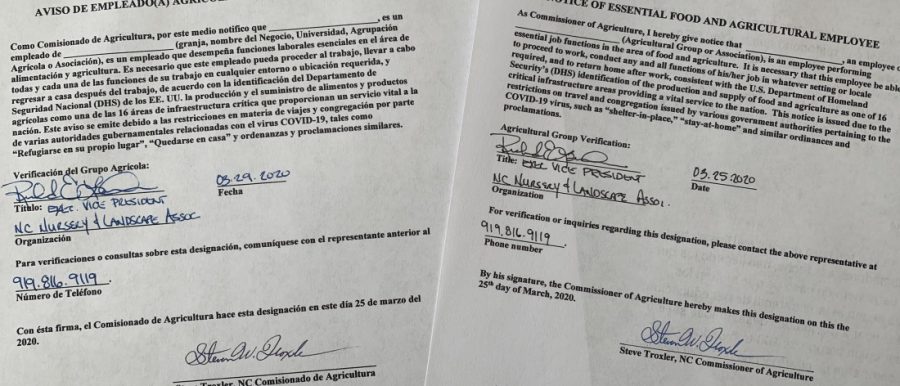Doing essential work raises fears for immigrant families
Drafts of work authorization letters from the N.C. Department of Agriculture, in English and Spanish, for essential food and agricultural employees throughout the state.
With the coronavirus being a threat for many of us it is hard to think about having to stop going to work. But the government has put up a state law that only essential labor can continue in the United States. As of now, my family has been lucky enough to continue having income to pay our bills. My husband works in landscaping, considered essential for the good of the grass which is growing like crazy.
My husband is not only afraid of being exposed to COVID-19, but also of being stopped by an officer and asked for a work letter—which he has—and a driver’s license, which he doesn’t have. He is an immigrant who is currently in the process of getting legal status in the U.S., but that doesn’t mean he is safe from being deported. Many immigrants are facing the same fear, but what can you do when you have a family that is counting on you to pay bills? Even with the requirement that essential workers must have a letter from their employers, officers are still able to ask for a driver’s license, which can put many undocumented people on the spot.
Before the pandemic, President Donald Trump was considering undocumented people a threat to the country because he claimed they were stealing jobs and that they were criminals. Well, it’s very ironic that now the president and the government are considering those same immigrants essential for the country. Many immigrants are laborers, such as farmers, landscapers, construction workers, cleaning and factory workers, etc. Those immigrants are now stabilizing the country by providing food for our tables every day. Without working farmers, we would be out of food and with nothing left to survive on.
An April 2 New York Times article discusses farm workers having to work during the pandemic non stop due to high demand of food supplies needed around the country. The government has considered immigrants an essential part in our day to day needs.
The article “Farmworkers, Mostly Undocumented, Become ‘Essential’ During Pandemic,” states that “Ms. Silva, who has spent much of her life in the United States evading law enforcement, now carries a letter from her employer in her wallet, declaring that the Department of Homeland Security considers her ‘critical to the food supply chain.’”
Like Nancy Silva, there are many other workers that have to go out and work, knowing that they are at risk with no other choice. The government is providing unemployment benefits for those who are not able to work. Undocumented people don’t have that choice because they don’t qualify for it. They will also not qualify for the stimulus checks that the government will be providing families. Although some immigrants work and pay taxes, they will still not be considered for benefits because they don’t have a social security number.
It’s really hard for families that are in this situation because they have to go to work and risk their lives and the lives of their loved ones, just like many people in the medical field, in order to survive. My husband will not be considered for the stimulus check. He also doesn’t get unemployment benefits, so if he didn’t work we would not have any source of income because I’m a full-time student. We would not be able to pay any of our bills or for the supplies that we need for our home. We also would be left with a lot of debt that can become a big problem in the future.
Many families are already facing all these problems because one or more family members don’t have jobs. My sister-in-law is in one of those families. She is currently in the last trimester of her pregnancy, with less than a month before her baby’s due date, June 12. She is employed in housekeeping and has stopped working.
“I have been wanting to become a mother for more than 12 years and God has given me that opportunity,” my sister-in-law said. “I don’t want a virus to ruin that for me.”
In her situation, she doesn’t have any other choice than to stay at home and depend on her husband’s income. But unfortunately, he has stopped working because he works in construction. In his job there are more than 100 people working, which is not allowed by the governor’s order. The order states that there cannot be more than 50 people in one place.
“My boss has me on call whenever there is a job opportunity, but there are still a lot of people working in one same place. I don’t want to get infected and then infect my wife,” my brother-in-law said. “We have been wanting this baby for a long time and nothing is going to stop us from meeting him.”











